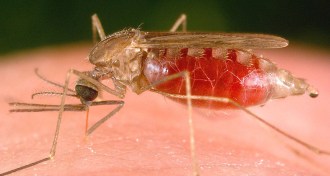Health & Medicine
-
 Health & Medicine
Health & MedicineHeart disease patients more apt to take one combined pill than many
Patients stayed on track better with a "polypill" than with three medications.
By Nathan Seppa -
 Health & Medicine
Health & MedicineTest could warn of problems for kidney transplant recipients
A urine test for an immune protein might tell doctors whether a patient is headed for trouble.
By Nathan Seppa -
 Health & Medicine
Health & MedicineDon’t stand so close to me
Personal space has a measurable boundary, a study suggests.
-
 Health & Medicine
Health & MedicinePower of sugar may come from the mind
Only people who believe exertion zaps willpower get a boost from glucose.
-
 Life
LifeYears or decades later, flu exposure still prompts immunity
New forms of influenza viruses can spur production of antibodies to past pandemics in people who lived through them.
-
 Health & Medicine
Health & MedicineClues emerge to explain allergic asthma
Tests in mice reveal that allergens can trigger inflammation by cleaving a clotting protein.
By Nathan Seppa -
 Health & Medicine
Health & MedicineGut-brain communication failure may spur overeating
Restoring a depleted molecule in obese mice repaired their abnormal response to food.
-
 Health & Medicine
Health & MedicineRacial homogeneity in early childhood may affect brain
In lab study, kids who lived in single-race orphanages have difficulty interpreting emotions on faces with foreign features.
-
 Health & Medicine
Health & MedicineMediterranean diet may offset genetic risk for stroke
Compared to a low-fat diet, eating fish and olive oil kept blood sugar levels lower in people with a common diabetes risk factor.
-
 Health & Medicine
Health & MedicineCamels implicated as possible hosts of MERS virus
Antibodies to a mysterious pathogen that has sickened 94 people were found in camels in Oman and the Canary Islands.
-
 Health & Medicine
Health & MedicineVaccine protects against malaria in early test
A series of shots enables volunteers to fend off a live infection by the disease-causing parasite.
By Nathan Seppa -
 Health & Medicine
Health & MedicineHigh blood glucose levels linked to dementia
Elderly people with elevated blood glucose levels are more apt to develop dementia, whether or not they have diabetes.
By Nathan Seppa